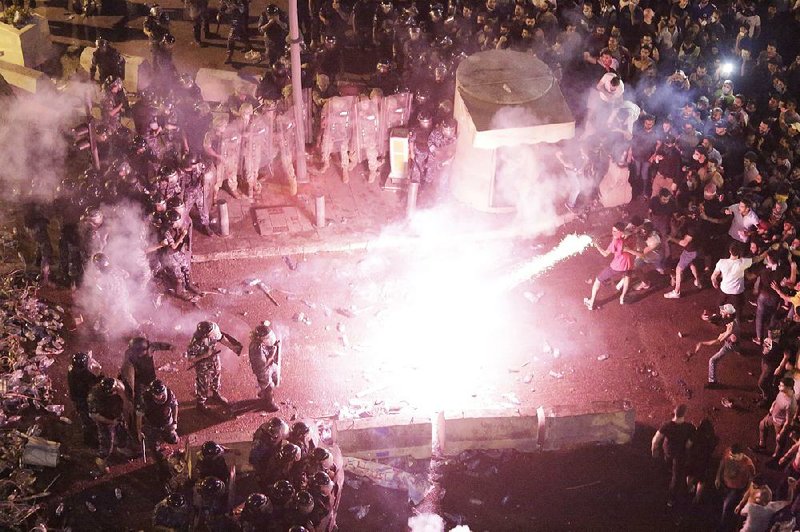BEIRUT -- Lebanon's prime minister gave his partners in government a 72-hour ultimatum to come up with "convincing" solutions for a rapidly worsening economic crisis, as nationwide protests against the country's ruling political class continued to escalate.
In an address to the nation and with hundreds of rowdy protesters camped outside his office, Saad Hariri blamed politicians in his national unity government, which includes the Iran-backed Hezbollah group and rival political parties, for blocking his agenda at every turn.
After his speech, groups of rioters broke away from the protesters to clash with police, set cars ablaze and smash store windows in the streets of Beirut.
Thousands of protesters have been rallying across the country this week, raging against top leaders, including the president, prime minister and parliament speaker, whom they blame for decades of corruption and mismanagement.
The protests are the largest Lebanon has seen since 2015 and could further destabilize a country whose economy is already on the verge of collapse.
[Video not showing up above? Click here to watch » https://www.youtube.com/watch?v=0vNTYHxtmSk]
The protests, triggered partly by a proposal for a $6 monthly fee for WhatsApp voicecalls, drew people from all religious and political backgrounds and were largely peaceful, although violence was reported in several areas. Many said they would remain on the streets until the government resigned.
Hariri said he understood the people's "pain" and anger at his government's performance and said "we are running out of time."
He said he was giving 72 hours for the government to come up with "clear, decisive and final" decisions regarding his proposals to fix the ailing economy.
Shortly after his speech, security forces fired tear gas and water cannons to disperse the protesters in central Beirut, leading to confrontations between police and young men in a downtown square. Others marched on the presidential palace in a southeast suburb of the capital.
The prime minister has led two national unity governments since 2016, which included his domestic rivals Hezbollah. The current government is dominated by the group and its allies.
The militant group has remained silent about the protests.
Time and again, the protesters shouted "Revolution!" and "The people want to bring down the regime," echoing a refrain chanted by demonstrators during Arab Spring uprisings that swept the region in 2011.
Protesters took aim at the country's political leaders, including President Michel Aoun and his son-in-law, Foreign Minister Gebran Bassil, as well as the prime minister and parliament speaker, blaming them for systemic corruption they say has pillaged the country's resources for decades.
"We are here today to ask for our rights. The country is corrupt, the garbage is all over the streets and we are fed up with all this," said Loris Obeid, a protester in downtown Beirut.
Schools, banks and businesses shut down as protests escalated and widened in scope to reach almost every city and province. People burned tires on highways and intersections in suburbs of the capital, Beirut, as well as in northern and southern cities, sending up clouds of black smoke in scattered protests.
The tension has been building for months, as the government searched for new ways to levy taxes to manage the country's economic crisis and soaring debt.
The trigger, in the end, was the news Thursday that the government was planning, among other measures, to impose a tax on Whatsapp calls -- a decision it later withdrew as people began taking to the streets.
Years of regional turmoil -- worsened by an influx of 1.5 million Syrian refugees since 2011 -- are catching up with Lebanon. The small Arab country on the Mediterranean has the third-highest debt level in the world, currently standing at about $86 billion, or 150% of its gross domestic product.
Information for this story was contributed by Fadi Tawil, Hassan Ammar and Bassam Hatoum of The Associated Press.
A Section on 10/19/2019

